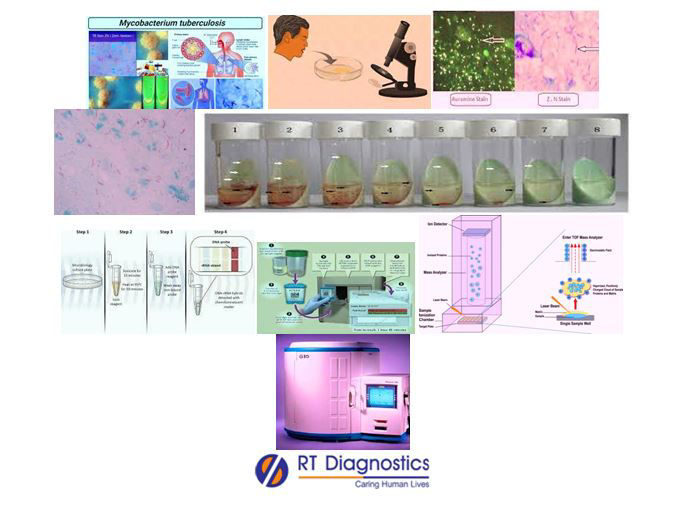Culture AFB by Bactec:
Why Culture AFB by Bactec Test?
CLINICAL INFORMATION
Mycobacterium tuberculi is an acid-fast bacillus that causes tuberculosis and other related infections pertained to it. It mainly affects the lungs but on reactivation can also affect other body parts of the body, including brain, spine, bones, kidney etc. AFB culture is the inoculation of clinical specimen (eg. sputum or phlegm – thick mucus that is coughed up from the lungs) onto its specific culture media (L J Growth Media: Lowenstein-Jensen Slant Media, culture maintained at 37C for up to 6 weeks – incubation period required for detection of AFB growth) or Becton-Dicinson Mycobacteria Growth Indicator Tube – i.e BD MGIT Broth. The basic test procedure is that the sample specimen (such as sputum or phlegm – thick mucus that is coughed up from the lungs) to be tested is inoculated into the test vial, and is then fed into the BACTEC instrumental equipment gadget (Automated Blood Culture System that detects growth of organisms in blood culture bottles) for incubation and periodic reading. Culture of AFB by BACTEC: The BACTEC is an advanced technological instrumental gadget that deploys the principle of a radiometric method (utilizes fluorescent technology) has been used for several years for rapid isolation of bacteria. It is based on the measurement of 14CO2 produced by the bacteria, when 14C labeled palmitic acid present in the liquid media of the culture, when gets metabolized. Each vial contains a sensor which responds to the concentration of CO2 produced by the metabolism of microorganism (consumption of oxygen needed for the growth of micro-organism – such as AFB). Apart from Mycobacterium tuberculi, this test can also detect the presence of another group of mycobacteria referred to as non-tuberculous mycobacteria (NTM) and few of its examples include Mycobacterium marinum (grows on fish tanks and in some skin infection), MAC- Mycobacterium avium-intracellulare complex (seen in people with weakened immunity or patients with immunosuppressive medications causes lung infection) etc. Clinical manifestations include active lung infection i.e phlegm or sputum with bloody streaks, fever, chills, night sweats, loss of appetite, unexplained weight loss, fatigue or weakness, chest pain etc. Other tests include AFB Staining for microscopy detection, IGRA blood test, Tuberculin skin test (by PPD ie Purified Protein Derivative) – Mantoux Screening Test, Mycobacterium tuberculosis NAAT (Nucleic Acid Amplification Test) Test etc. In suspected cases of TB dissemination, the other test sample specimen may be ordered (with manifestation of extra-pulmonary sites) which includes CSF (meningitis with manifestation of constant headache, altered mental state, increased intracranial pressure leading to projectile vomiting), fluid aspirates, bronchial wash, Bone or bone marrow samples (osteomylitis), other related tissue biopsies etc for histo-pathological tests, susceptibility testing or sensitivity test to indicate drug resistant strains (MDR-TB: Multi Drug Resistant Tuberculosis) for effective treatment (called extensively drug resistant tuberculosis: XDR- TB).

General Instructions:
Sample Requirement: Specimen - Phlegm Test Preparation: None.
NOTE - Sample for specimen collections may vary based on the patient’s condition / cases according to patient’s presenting complaints / signs or symptoms:
SPECIMEN REQUIREMENT (Special or Rare Cases) - As instructed and guided by Physician / Clinician / Pathologist / as per Laboratory’s requirements, according to procedures and protocols.
Sample Requirement: Phlegm
Test Preparation: None
This Multi-Specialty Clinical Referral Laboratory RT DIAGNOSTICS provides precise and accurate tests with an extensive range of testing services to the medical centers to help in the diagnosis and identification of pathology in the test specimens for infectious diseases and also to evaluate the function of organ systems of the patient. It prevents further complications and helps to stabilize and restore health to near normalcy at the earliest without delay.



